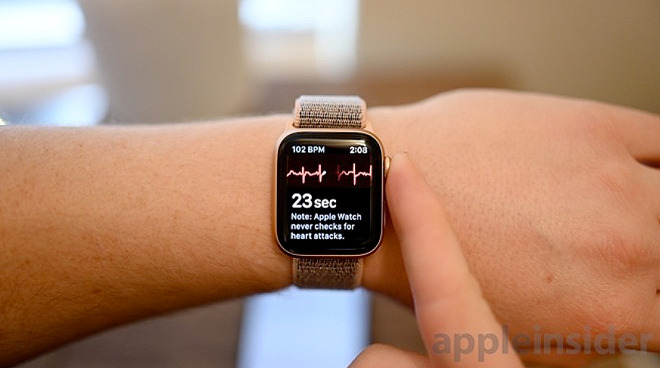Doctor credits Apple Watch for saving his life
The Apple Watch has saved another life, according to a story shared by a California-based anesthesiologist who claims it helped him discover his own hidden heart condition that requires corrective surgery.

Apple claims that the Apple Watch is only capable of detecting atrial fibrillation -- also known as aFib -- a form of irregular, rapid heart rate that can cause poor blood flow. However, one Californian doctor says his Apple Watch helped detect underlying heart disease in himself.
Dr. Donald W Milne from Antelope Valley Hospital shared the story with 9to5Mac, and also sent the story to Tim Cook
The Apple Watch has been a health-forward device since its inception, so there has been no shortage of stories where it has helped save people's lives.
In February AppleInsider reported on an Oklahoman teen got an Apple Watch alert stating he had an unusually high heart rate while being seated in class. Ultimately, his doctors diagnosed him with Supraventricular Tachycardia, and he spent eight hours in surgery and has since made a full recovery.
In June, a 92-year-old retired Nebraska farmer credited the Apple Watch Fall Detection feature with saving his life after a 21-foot fall.

Apple claims that the Apple Watch is only capable of detecting atrial fibrillation -- also known as aFib -- a form of irregular, rapid heart rate that can cause poor blood flow. However, one Californian doctor says his Apple Watch helped detect underlying heart disease in himself.
Dr. Donald W Milne from Antelope Valley Hospital shared the story with 9to5Mac, and also sent the story to Tim Cook
Of course, being able to interpret his ECG readings accurately played a large part in his ability to diagnose that something was wrong.I have the first generation of the Apple Watch to be able to do heart monitoring. I know that the primary intended use is to monitor for atrial fibrillation. As a 66 year old anesthesiologist I use my watch for many occasions.
However a number of months ago I was working out on an elliptical machine, And I experienced more shortness of breath than usual for a workout. I used the ECG function to take an ECG at that time.
I observed ST segment depression on the tracing. That resolved and returned to normal with rest. This was again documented by the tracings.
I had no history of any heart disease prior to this incident.
An appointment with my primary care physician obtained a resting ECG in her office that was normal. However upon showing the tracing with the ischemia she agreed and referred me to a cardiologist at John Muir Concord hospital .
He agreed as well with the assessment and upon having an angiogram yesterday the finding of critical diffuse coronary artery disease was found and I am now scheduled for a 5 vessel bypass and aortic valve replacement on July 13 2020.
A long story short is that without the Apple Watch tracing I would never have known I had disease in time to be able to intervene before having a potentially fatal heart attack.
The Apple Watch has clearly saved my life.
The Apple Watch has been a health-forward device since its inception, so there has been no shortage of stories where it has helped save people's lives.
In February AppleInsider reported on an Oklahoman teen got an Apple Watch alert stating he had an unusually high heart rate while being seated in class. Ultimately, his doctors diagnosed him with Supraventricular Tachycardia, and he spent eight hours in surgery and has since made a full recovery.
In June, a 92-year-old retired Nebraska farmer credited the Apple Watch Fall Detection feature with saving his life after a 21-foot fall.

Comments
Anyway, it is still a positive story and I'm happy he is on the road to good health...and no doubt the Apple Watch is an incredible device whose application far exceeds that of just setting alarms and knowing the time.
I don't know anybody who has an at-home portable ECG device sitting in the medicine cabinet.
Fast forward to now, several years since Watch released, I am seeing more doctors giving due recognition and even making note of readings from my Watch (e.g. elevated resting heart rate during migraine attacks). It's definitely a welcome change in attitude from the medical care industries/services.
I think you may have overlook a key point - "during a workout, an ECG is perform" at that exact moment in time. This is extremely useful and important. I have close buddy who suffered heart issue and went through surgery after months of inability for the doctors to diagnose what's wrong. It took the 5th attack of heavy heart pondering symptom which he was finally able to reach A&E within 15-20 mins while the symptom was still occurring for the medical team to finally pick up what is happening and acknowledge there is indeed a serious problem. He went for the first surgery within a short timeframe, and 1-2 months later, a second surgery (cause the doctor worries if his body can take both surgeries done at one go). Unfortunately, this happened before Watch Series 4 was even announced/available, and he was having Watch Series 3 back then.
To summarise, ECG is mostly only useful when done during symptom happens. This seems to be pretty common knowledge with doctors I have spoken to. Often than not, ECG done during normal times usually do not pick up many of the heart problems/diseases that ain't having persistent/constant symptom.
From what I've read it seems like Apple hasn't even applied to have the feature rolled out in Australia:
“TGA has not received any applications for products manufactured and/or supplied by Apple, nor is there any Apple device included on the ARTG.”
https://www.gizmodo.com.au/2020/06/apple-watch-hearting-monitoring-australia-ecg/